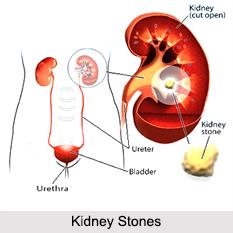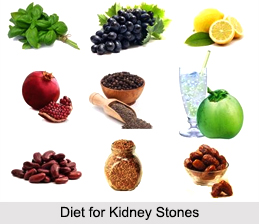 Kidney stones are one of the common kidney disorders. They are small, solid crystals that develop when salts or minerals in urine become solid inside the kidneys or uterus. The sizes of the solid masses may vary as they can be too small as a grain of sand or as large as a lemon. Kidney stones, also called renal calculi and depending on where they are located are also known as urinary calculi, urinary tract stone disease, renal calculi, nephrolithiasis, ureterolithiasis and urolithiasis.
Kidney stones are one of the common kidney disorders. They are small, solid crystals that develop when salts or minerals in urine become solid inside the kidneys or uterus. The sizes of the solid masses may vary as they can be too small as a grain of sand or as large as a lemon. Kidney stones, also called renal calculi and depending on where they are located are also known as urinary calculi, urinary tract stone disease, renal calculi, nephrolithiasis, ureterolithiasis and urolithiasis.
Causes of Kidney Stones
There are various factors which are responsible for the formation and growth of kidney stones. It can be due to underlying metabolic conditions, such as renal tubular acidosis, Dent"s disease, Hyperparathyroidism and medullary sponge kidney. Kidney stones are more common in patients suffering from Crohn"s disease.
In addition to these, deficiency of vitamin A causes a shedding of epithelium and causes kidney stones. Apart from these, altered urinary solutes and colloids, decreased urinary output of citrate, renal infection, prolonged immobilization, inadequate urinary drainage, Randall`s plaque and Microliths are traced as responsible for developing kidney stones.
Symptoms of Kidney Stones
The pain in kidney stone is typically colic in nature. It comes and goes in spasmodic waves. Pain in the back is felt when calculi produce an obstruction in the kidney. In addition to feeling severe pain in the back, a number of other symptoms may also occur with kidney stones. One of the most common is problem with urination. This can include:
•Pain while urinating
•Urine that appears cloudy
•Urine that smells differently than it normally does
•Nausea and vomiting
•Persistent need to urinate
•Fever and chills if an infection is present
•Urinating in small amounts
Diagnosis of Kidney Stones
Usually clinical diagnosis is done on the basis of the location and severity of the pain following the symptoms of the disease. Imaging is used to confirm the diagnosis and a number of other tests can be undertaken to help establish both the possible cause and consequences of the stone.
Types of Kidney Stones
The different types of kidney stones include:
•Calcium: Calcium stones are the most common. They are usually made of calcium oxalate, phosphate or maleate.
•Uric Acid: This type of kidney stone is more common in men than in women. They can occur in people with gout or those going through chemotherapy. This type of stone develops when urine is too acidic.
•Struvite: This type of stone is found mostly in women with urinary tract infections. These stones can be large and cause urinary obstruction. These stones are caused by a kidney infection.
•Cystine: Cystine stones are rare. They occur in both men and women who have the genetic disorder. Cystine is an acid that occurs naturally in the body-leaks from the kidneys into the urine.
Treatment of Kidney Stones
Treatment of kidney stones can be done in various ways. There are several alternative medicines that may prevent kidney stones from growing acute or developing to the extreme level of severity. In alternative medicines Diet Therapy, Hydrotherapy, Herbal medicines, Ayurveda, Naturopathic Treatment and Homeopathic Treatment are applied to lessen the acuity of the disease.
Diet for Kidney Stones
Most types of kidney stones are the result of an improper diet. So to minimize the risk of kidney stones, a proper diet should be followed. A diet that is low in fibre and high in refined carbohydrates, animal proteins and alcohol should be strictly avoided as advised by the doctors. Protein can cause problems by prompting the body to lose more calcium in the urine, making it available for stone formation. High intake of vegetables, fruits, whole grains, and beans are advisable to bar kidney stones. Water should be consumed in abundance as the doctors suggest it can lessen the acuity of the stones.




